|
|
|
Sort Order |
|
|
|
Items / Page
|
|
|
|
|
|
|
| Srl | Item |
| 1 |
ID:
092136
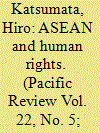

|
|
|
|
|
| Publication |
2009.
|
| Summary/Abstract |
Observers of Southeast Asian affairs commonly assume that the members of the Association of Southeast Asian Nations (ASEAN) are reluctant to pursue liberal agendas, and that their main concern is to resist pressure from Western powers to improve their human rights practice. This article, however, argues that such a conventional view is too simplistic. The Southeast Asian countries have voluntarily been pursuing liberal agendas, and their main concern here is to be identified as 'Western' countries - advanced countries with legitimate international status. They have 'mimetically' been adopting the norm of human rights which is championed by the advanced industrialized democracies, with the intention of securing ASEAN's identity as a legitimate institution in the community of modern states. Ultimately, they have been pursuing liberal agendas, for the same reason as cash-strapped developing countries have luxurious national airlines and newly-independent countries institute national flags. Yet it should be noted that the progress of ASEAN's liberal reform has been modest. A conventional strategy for facilitating this reform would be to put more pressure on the members of ASEAN; however, the usefulness of such a strategy is diminishing. The development of an East Asian community, the core component of which is the ASEAN-China concord, makes it difficult for the Western powers to exercise influence over the Southeast Asian countries. Hence, as an alternative strategy, this article proposes that ASEAN's external partners should 'globalize' the issue of its liberal reform, by openly assessing its human rights record in global settings, with the aim of boosting the concern of its members for ASEAN's international standing.
|
|
|
|
|
|
|
|
|
|
|
|
|
|
|
|
| 2 |
ID:
186600
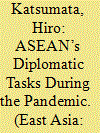

|
|
|
|
|
| Summary/Abstract |
What are the implications of COVID-19 for the diplomacy of the Association of Southeast Asian Nations (ASEAN)? What kinds of diplomatic tasks has the pandemic imposed on ASEAN, and in what way has the Southeast Asian association handled them? ASEAN’s most fundamental diplomatic task has of course been to continue building ASEAN communities, but the ability of the association of minor powers in Southeast Asia is limited. Hence, it can be said that ASEAN’s most important diplomatic task has been to maintain favorable relations with external powers, in particular, with China and the United States. The present study argues that ASEAN has managed to maintain favorable relations with and receive support from both of these external powers by conducting “equidistant diplomacy” with them. In concrete terms, it has fostered favorable relations with China. Yet, without relying excessively on Beijing, it made sure to foster such relations with the United States as well, thereby striking a reasonable balance between these two external powers.
|
|
|
|
|
|
|
|
|
|
|
|
|
|
|
|
| 3 |
ID:
097549
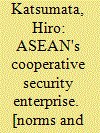

|
|
|
|
|
| Publication |
New York, Palgrave Macmillan, 2009.
|
| Description |
xiii, 204p.
|
| Standard Number |
9780230229297, hbk
|
|
|
|
|
|
|
|
|
|
|
|
Copies: C:1/I:0,R:0,Q:0
Circulation
| Accession# | Call# | Current Location | Status | Policy | Location |
| 055086 | 355.031095/KAT 055086 | Main | On Shelf | General | |
|
|
|
|
| 4 |
ID:
190665
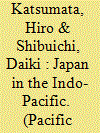

|
|
|
|
|
| Summary/Abstract |
Although Japan is commonly regarded as a strong proponent of the existing liberal international order championed by the US in the Indo-Pacific, sometimes it has been half-hearted in opposing a Sino-centric order and been rather supportive of Chinese diplomacy. In particular, it has to some degree supported the Belt and Road Initiative (BRI) implemented by Beijing, effectively offered its endorsement to the international legitimacy of the Chinese Communist Party (CCP) without problematizing human rights issues, and severely restricted the enhancement of its own defense capabilities. These policies have been shaped by pro-China individuals and groups who hold privileged positions inside the government, and their privileged positions have been determined by haphazard domestic political factors which have little to do with Sino-Japanese relations. This means that, although on the surface Japan may seem to have rationally calculated its international strategic interests and implemented hedging as a coherent strategy amid Sino-US rivalries, its implementation of what seems to be a hedging strategy has actually been incidental. Its policy has turned out to resemble what has been regarded by International Relations (IR) theorists as a hedging strategy, due to haphazard domestic political factors.
|
|
|
|
|
|
|
|
|
|
|
|
|
|
|
|
| 5 |
ID:
110244
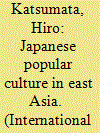

|
|
|
|
|
| Publication |
2012.
|
| Summary/Abstract |
This article seeks to enhance our understanding of an East Asian community by focusing on its cultural aspect. The specific focus of analysis is Japanese popular culture, whose elements include J-pop music, TV dramas, movies, manga (comic books), and anime (animations). This article sheds light on the progress of community building in the cultural sphere by demonstrating that Japanese popular culture has been favored by the people in the East Asian region. By so doing, it modifies our common beliefs about the characteristics of an East Asian community and our conventional expectations of the nature of an East Asian regional identity.
|
|
|
|
|
|
|
|
|
|
|
|
|
|
|
|
| 6 |
ID:
102428
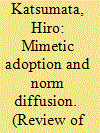

|
|
|
|
|
| Publication |
2011.
|
| Summary/Abstract |
The members of the Association of Southeast Asian Nations (ASEAN) have been pursuing new cooperative security agendas - namely, confidence-building measures (CBMs), preventive diplomacy (PD), conflict resolution and a set of agendas associated with security communities. The ASEAN members' pursuit of these agendas should be seen as a set of instances of their mimetic adoption of external norms for the sake of legitimacy. They have mimetically been adopting a set of norms associated with the collective management of conflicts, which have been practiced by the participant states of the Organisation for Security and Cooperation in Europe (OSCE). They have been doing so, with the intention of securing their identities as legitimate members of the community of modern states, and of enhancing the status of ASEAN and the ASEAN Regional Forum (ARF) as legitimate cooperative security institutions.
|
|
|
|
|
|
|
|
|
|
|
|
|
|
|
|
| 7 |
ID:
055167
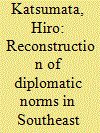

|
|
|
| 8 |
ID:
131064
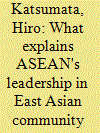

|
|
|
|
|
| Publication |
2014.
|
| Summary/Abstract |
Conventional wisdom holds that the Association of Southeast Asian Nations (ASEAN) has been able to lead community building in East Asia by default, against the background of Sino-Japanese rivalries. The present study maintains that this line of argument is insufficient, and offers a complementary account, centered on the statement that ASEAN has actively constructed a social environment which defines itself as the legitimate leader of East Asian community building. More specifically, the leadership of ASEAN can be explained in terms of three parallel developments since the early 1990s that are associated with the Asia-Pacific framework of the ASEAN Regional Forum (ARF): the Southeast Asian association has been able to lead community building in East Asia becauseissue_image_87_2_Katsumata (1) it has advanced the vision of an "East Asian community" by drawing on its cooperative security norm embodied in the ARF; (2) through their participation in the ARF process, the Northeast Asian powers have come to recognize the value of ASEAN's cooperative security norm, and thus to share with the Southeast Asian nations their vision of an East Asian community; and (3) the sharing of a community-building vision by all the East Asian countries has constituted a structure that makes it costly for the Northeast Asian powers to challenge the Southeast Asian association.
|
|
|
|
|
|
|
|
|
|
|
|
|
|
|
|
| 9 |
ID:
072994
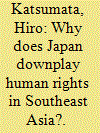

|
|
|
|
|
| Publication |
2006.
|
| Summary/Abstract |
Japan makes little effort to promote human rights in Southeast Asia, although it sees itself as an advanced industrialized democracy. In comparison with the United States and the European Union (EU), Tokyo's approach is less intrusive and coercive, and more tolerant and accommodative. What can be described as the economic-interest explanation holds that Japan takes a non-intrusive approach in order to maintain favorable relations with the Southeast Asian countries, so as to maximize its interests in the areas of trade and investment, and official development assistance (ODA). The present study finds that this line of argument is insufficient, and thus puts forward an alternative explanation. The identity explanation holds that Japan has been sympathetic to the special concern of the Southeast Asian countries over state sovereignty, and thus takes a non-intrusive approach. This is because while Japan sees itself as an advanced industrialized democracy it also identifies itself as an Asian country.
|
|
|
|
|
|
|
|
|
|
|
|
|
|
|
|
| 10 |
ID:
051989
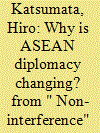

|
|
|
|
|
| Publication |
Mar-Apr 2004.
|
|
|
|
|
|
|
|
|
|
|
|
|
|
|
|
|
|
|
|
|